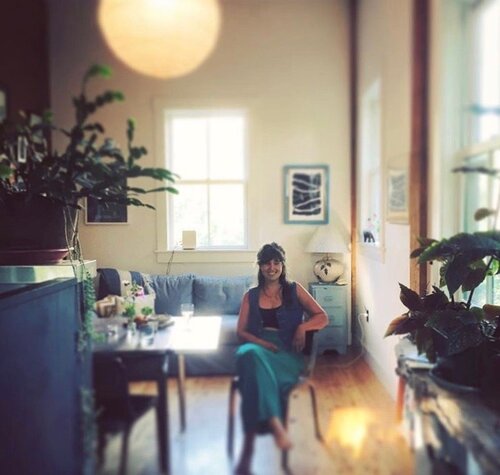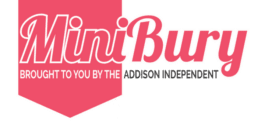

You’ve probably seen Katie McEachen out in the Vermont woods — for more than a decade she has worked in early childhood education (much of it outdoors), including founding Wren’s Nest Forest Preschool and Living Forest Summer Camps.
She’s recently begun a new endeavor, working as an early childhood consultant one-on-one with parents and offering professional development trainings for organizations, educators and homeschool families who want to deepen their nature curriculum.
The Addison Independent‘s John McCright interviewed her last week for our Babies & Families issue.
JM: How have ideas about parenting changed over the past few generations?
KM: Parenting appears to be more intensive than it used to be. It requires more time, more energy, and more resources. It is more child-centric, which is great in a lot of ways. People are realizing how important the early years are for development, and are learning more about children’s needs.
But being overly child-centric can also have negative consequences. Parents expect themselves to constantly be “on,” or they feel guilty if they aren’t engaging with their child at all times. This can lead to parent burn-out, parents often putting aside their own needs to make sure they are doing right by their children. It also limits the time and opportunity children have to develop their own inner lives through solo play or exploration.
In addition, while expectations of parents have increased, cultural and government supports for children and families have not increased at the same rate, so many families find themselves struggling.
JM: How much baggage do young parents bring with them from their own experiences of being parented?
KM: I believe the best way to address our childhood baggage is to do our own inner work. Kids will find our sensitive emotional points and trigger us, guaranteed.
It’s OK to be vulnerable with children, change our minds if we think it’s appropriate, and apologize and start again if we have to. If we can make time for personal inner work (which I know is no small feat when you have kids) we can learn to understand when we are acting from our inherited parent scripts or our authentic values.
Having an awareness of triggers and reactions goes a long way in helping us self-regulate and interact with children in the most respectful, constructive way.
JM: What are the best ways to learn how to be a better parent? Books, websites, classes, family, friends?
KM: All of the above. I personally find Janet Lansbury, an online educator and podcaster, to be really helpful. To name a few local resources, there’s the wonderful Addison County Parent-Child Center in Middlebury. Good Beginnings Central Vermont has a lot to offer in terms of transitioning into parenthood. There are parent/child classes available at the Lake Champlain Waldorf School and Child Care Resource in Williston also has many resources available.
If you already have children, they are some of your best teachers! Observing and listening to them, and honoring the people they are, can help you hone in on what kind of resources to look for. Talking to your child’s teachers can also be helpful, because they know your child well as an individual.
There are so many different philosophies and views on raising children that it can be really overwhelming, so getting clear on your parenting values is helpful in narrowing down your search.
It’s important to remember that you know your child better than any other adult in their lives, and it’s OK if you don’t agree with everything an educator or expert says about parenting and children. Trust your gut, take what works for you and leave the rest.
JM: How should a prospective mother/father prepare?
KM: I don’t think it’s ever too soon or too late to prepare. Everyone says you can’t really be prepared for the realities of parenting, because you don’t know what you don’t know. There are some things you simply can’t prepare for. But preparing doesn’t mean you expect a specific outcome — it just means doing your best to gather tools that will hopefully come in handy. Some things that might help a prospective parent prepare:
• Put thought into what your values are around raising a child, and then look for resources and friends/experts/teachers that align with those values.
• Talk to your friends with children, and babysit for their kids once in a while!
• Do some inner work processing your own childhood, deepen your own emotional regulations skills, do some reading about child development.
• Read about other parents’ experiences, and know that your experience may or may not be similar.
• Be prepared to be flexible and open when you meet your child — be willing to experiment and allow yourself not to be perfect.
None of these things will be enough — only experience will give you the full picture, but you can gather info and insights like you are packing for a backpacking trip: You don’t quite know what you’ll experience on the trip, but you can make your best guess about what you might need based on advice from people who’ve hiked the trail before you.
JM: Every kid is different, so what kinds of things can parents learn that are universal across all kids?
KM: Respect children as whole human beings with the same emotions and emotional needs as adults (although the adults in their lives will help them learn how to understand and regulate those emotions). Every emotion is valid, and kids should be allowed to feel however they feel. We offer them unconditional love and validate their feelings, but give them feedback and boundaries around their behavior.
• Children need clear boundaries to feel safe. What these boundaries look like may vary depending on the child, the parent, and the situation. Our job as adults is to create a container for them, and their job is to test the edges of that container. Despite occasional evidence to the contrary, kids actually want to know that the adults taking care of them are calm, capable leaders. Being clear about our expectations is actually one of the kindest things we can do.
• Spend lots of time outside! Being connected to nature and place is a must for the mental, social, emotional and physical health of all humans, especially small ones.
JM: What is the goal of parenting (other than just surviving)?
KM: Everyone has their own goals for raising children. It might be someone’s goal to create a dynamic, loving home where little people can grow into happy adults, or to give your children more opportunities than you had; to raise someone who contributes to their community, or create a strong family unit. Possibly all of the above.
Reaching those overarching goals takes time and isn’t a linear process. But I would say whatever your goals are, you can get closer to reaching them by tending to, strengthening and building the connection between you and your child.
I think another important goal while parenting should be balancing the needs and well-being of everyone in the family, which includes the parents. Being a parent isn’t the only important part of a person’s identity, but due to the intensive nature of parenting today, it’s often the part that gets prioritized. I want parents to feel empowered to take the time they need to refill their own buckets, and to know that sometimes making boundaries around when they are available to their children is OK.
JM: Does parenting get easier?
KM: I’ve observed that the answer is probably both yes and no. There are new and different rewards and challenges with each stage. Some people resonate with some stages more than others. You may love the baby stage but find the toddler years really challenging, or vice versa. The physical exhaustion of the early years may give way to more emotional stress in the teen years.
Your concerns and worries may shift as your kids get older. Parenting is dynamic and always changing, so it is probably never truly easy.
However, you know your child better the longer you spend parenting them, and over time, you hopefully become clearer on who you are as a parent. Every new circumstance has the potential to help you develop your patience, your confidence and get clearer on your priorities.
You can find out more about Katie on her website.
